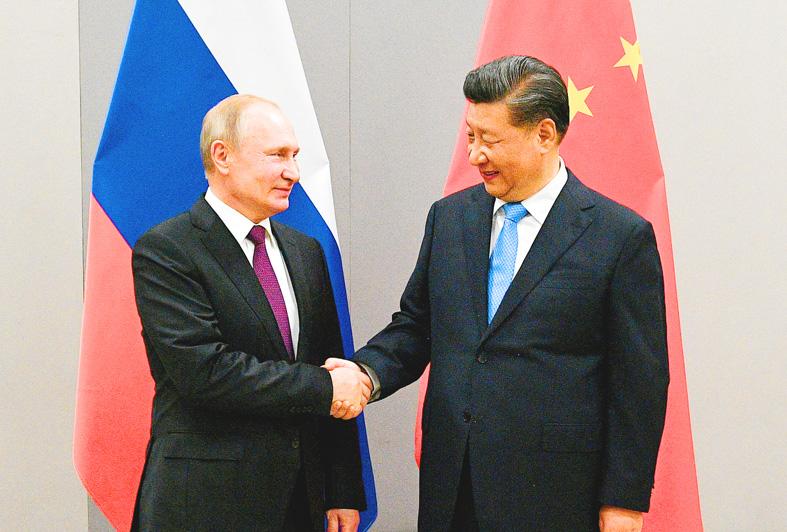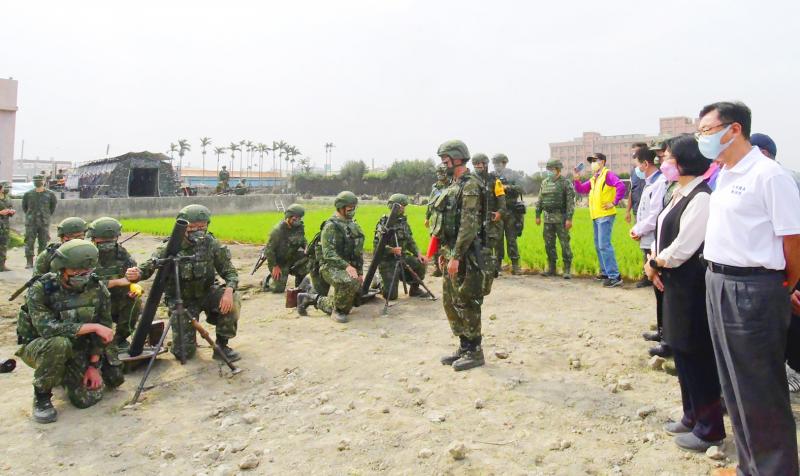Chinese academics have reportedly been instructed to evaluate the possibility of unifying with Taiwan by force, as the war in Ukraine has caused Beijing to bring the Taiwan question to the fore of its agenda, a national security official said on Sunday.
The Chinese Communist Party (CCP) is moving ahead on its “overall strategy for resolving the Taiwan issue in the new era,” which centers on peaceful methods such as legal or other action, the official said, speaking on condition of anonymity.
However, it is also studying the possibility of using force, including lessons to be learned from Russia’s invasion of Ukraine and the potential effects of sanctions, they said.

Photo: Reuters
The CCP is likely to use violent and nonviolent methods in pursuit of the least costly resolution, the official said.
If Chinese President Xi Jinping (習近平) chooses to imitate Russia and pursue a military solution, it would first try to create the most beneficial environment possible, they said.
That might entail elaborating on its “one China” principle, urging countries not to interfere, sowing discord among Taiwanese, guarding against potential sanctions and forming a plan for reconstruction after invasion, they added.

Photo courtesy of the Changhua County Government via CNA
There are three main ways the conflict in Ukraine could play out, each with a different effect on Taiwan, the official said.
In the first scenario, Russia wins the war and Russian President Vladimir Putin gets everything he wants, including the surrender of Kyiv and its vow not to join NATO, they said, adding that only under this scenario would Putin end the war.
This scenario, in which military action by an authoritarian state proves successful, would be the worst for Taiwan, as it would embolden Xi to launch his own conflict, the official said.
In the second scenario, the war continues for longer than two months, dragging Russia further toward economic collapse, although Putin would be unable to retreat for fear of the political repercussions, the official said.
Meanwhile, the refugee crisis in Europe and inflation in the US would worsen, potentially affecting the US midterm elections, they said.
Facing mounting challenges, these nations would request assistance from China, thereby enabling Beijing to exert greater influence internationally and pressure Western nations into accepting its interpretation of the “one China” principle and other concessions, the official said.
The last scenario would involve a successful resistance from Ukraine with international support that would force Putin from power, the official said.
This would be encouraging for Taiwan, which could learn from Ukraine how to defend itself and show China the potential consequences of starting a military conflict, they said.
However, each of these scenarios is variable, the official said.
Beijing could decide that peaceful unification is impossible and decide to attack before Taiwan completes its defense preparations, they said, adding that there is always the chance a dictator could externalize domestic problems.

NATIONAL SECURITY THREAT: An official said that Guan Guan’s comments had gone beyond the threshold of free speech, as she advocated for the destruction of the ROC China-born media influencer Guan Guan’s (關關) residency permit has been revoked for repeatedly posting pro-China content that threatens national security, the National Immigration Agency said yesterday. Guan Guan has said many controversial things in her videos posted to Douyin (抖音), including “the red flag will soon be painted all over Taiwan” and “Taiwan is an inseparable part of China,” while expressing hope for expedited “reunification.” The agency received multiple reports alleging that Guan Guan had advocated for armed reunification last year. After investigating, the agency last month issued a notice requiring her to appear and account for her actions. Guan Guan appeared as required,

A strong cold air mass is expected to arrive tonight, bringing a change in weather and a drop in temperature, the Central Weather Administration (CWA) said. The coldest time would be early on Thursday morning, with temperatures in some areas dipping as low as 8°C, it said. Daytime highs yesterday were 22°C to 24°C in northern and eastern Taiwan, and about 25°C to 28°C in the central and southern regions, it said. However, nighttime lows would dip to about 15°C to 16°C in central and northern Taiwan as well as the northeast, and 17°C to 19°C elsewhere, it said. Tropical Storm Nokaen, currently

PAPERS, PLEASE: The gang exploited the high value of the passports, selling them at inflated prices to Chinese buyers, who would treat them as ‘invisibility cloaks’ The Yilan District Court has handed four members of a syndicate prison terms ranging from one year and two months to two years and two months for their involvement in a scheme to purchase Taiwanese passports and resell them abroad at a massive markup. A Chinese human smuggling syndicate purchased Taiwanese passports through local criminal networks, exploiting the passports’ visa-free travel privileges to turn a profit of more than 20 times the original price, the court said. Such criminal organizations enable people to impersonate Taiwanese when entering and exiting Taiwan and other countries, undermining social order and the credibility of the nation’s

‘SALAMI-SLICING’: Beijing’s ‘gray zone’ tactics around the Pratas Islands have been slowly intensifying, with the PLA testing Taiwan’s responses and limits, an expert said The Ministry of National Defense yesterday condemned an intrusion by a Chinese drone into the airspace of the Pratas Islands (Dongsha Islands, 東沙群島) as a serious disruption of regional peace. The ministry said it detected the Chinese surveillance and reconnaissance drone entering the southwestern parts of Taiwan’s air defense identification zone early yesterday, and it approached the Pratas Islands at 5:41am. The ministry said it immediately notified the garrison stationed in the area to enhance aerial surveillance and alert levels, and the drone was detected in the islands’ territorial airspace at 5:44am, maintaining an altitude outside the effective range of air-defense weaponry. Following